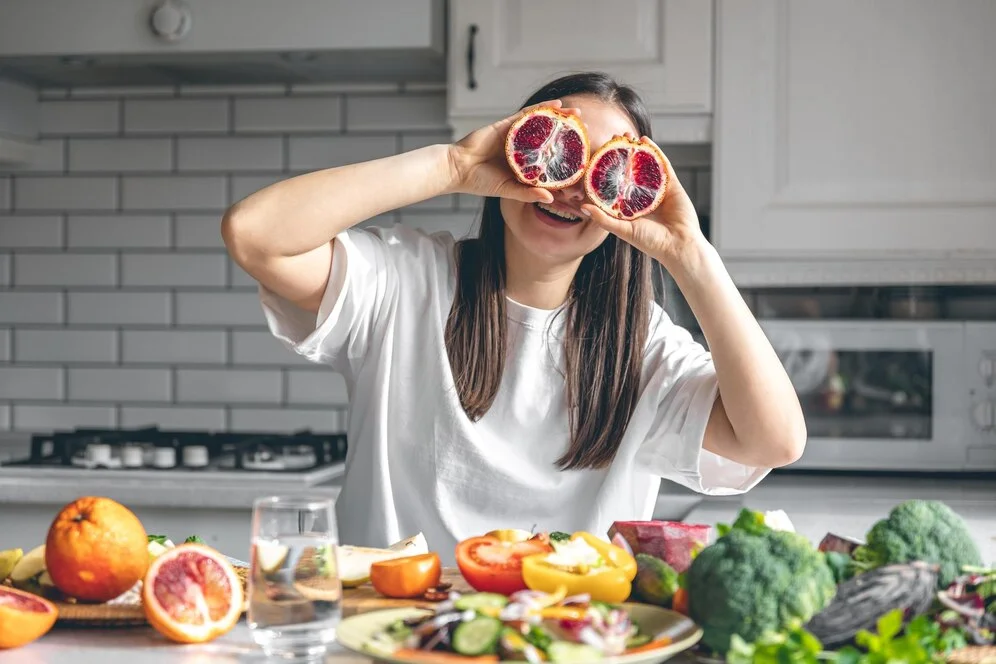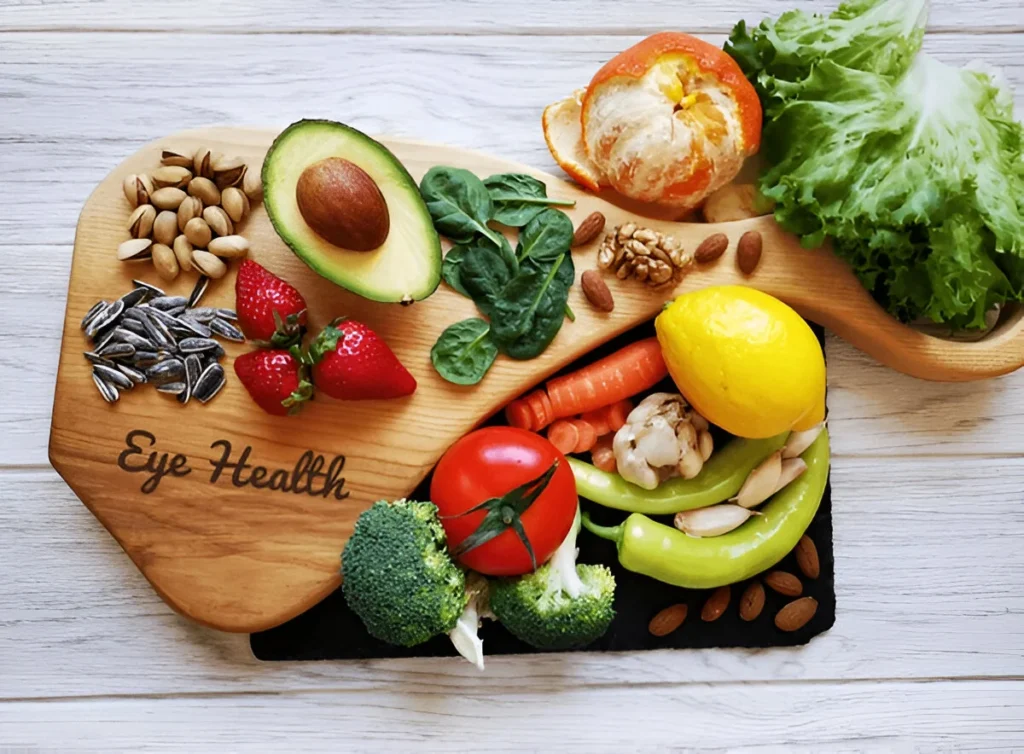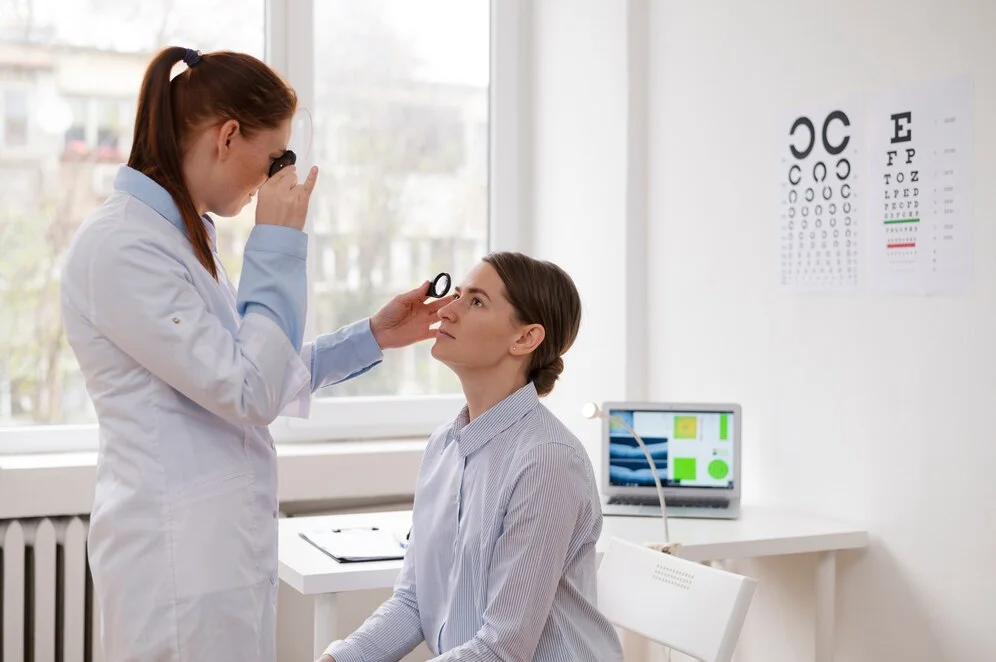Good vision is essential for a quality life, and what you eat plays a crucial role in maintaining optimal eye health. With increased screen time and environmental stressors, our eyes are more vulnerable than ever. Fortunately, the right nutrition can help protect and enhance vision.
In this blog, we will explore the best foods for better eye health, backed by science, and how they contribute to sharper and healthier eyesight.
Why Nutrition Matters for Eye Health
Your eyes rely on essential nutrients to function properly and defend against age-related conditions such as cataracts, glaucoma, and macular degeneration. Nutrients like vitamins A, C, and E, omega-3 fatty acids, lutein, and zinc are critical for preventing vision-related issues.
A well-balanced diet rich in these elements can help reduce oxidative stress, improve eye hydration, and even slow down degenerative diseases.

Best Foods for Better Eye Health
1. Leafy Green Vegetables (Spinach, Kale, Broccoli)
- Rich in lutein and zeaxanthin, antioxidants that protect against macular degeneration.
- Contain vitamin C, which strengthens eye tissues and reduces the risk of cataracts.
- Best consumed fresh or lightly steamed to retain nutrients.
2. Fatty Fish (Salmon, Tuna, Mackerel)
- High in omega-3 fatty acids, essential for reducing dry eye syndrome and inflammation.
- DHA, a component of omega-3s, supports the retina’s structural health.
- Eating fish twice a week can significantly enhance eye lubrication.
3. Carrots and Sweet Potatoes
- Rich in beta-carotene (Vitamin A), crucial for maintaining night vision.
- Helps in the production of rhodopsin, a protein that aids in low-light vision.
- Regular consumption prevents night blindness and keeps corneas healthy.
4. Eggs
- Packed with lutein, zeaxanthin, and zinc, which prevent cataracts and macular degeneration.
- Egg yolks contain high-quality protein and essential fatty acids that support eye muscle strength.
- Easily incorporated into a daily diet through breakfast options.
5. Citrus Fruits (Oranges, Grapefruits, Lemons)
- Abundant in vitamin C, which protects against oxidative stress.
- Promotes healthy blood vessels in the eyes and prevents inflammation.
- Strengthens the immune system, reducing the risk of infections.
6. Nuts and Seeds (Almonds, Walnuts, Chia Seeds)
- Excellent sources of vitamin E, which combats age-related vision decline.
- Provide essential omega-3 fatty acids, promoting eye hydration.
- A handful of nuts per day can offer long-term eye benefits.
7. Bell Peppers
- One of the richest sources of vitamin C, improving overall eye function.
- Contains beta-carotene and antioxidants, which prevent oxidative damage.
- A great addition to salads, stir-fries, or grilled dishes.
8. Dairy Products (Milk, Yogurt, Cheese)
- Provide vitamin A and zinc, essential for night vision and corneal health.
- Strengthen the retina and protect against UV damage.
- Choose fortified dairy options for added health benefits.
9. Legumes (Lentils, Chickpeas, Kidney Beans)
- High in zinc, which supports the retina and prevents night blindness.
- A cost-effective source of plant-based protein and fiber for overall wellness.
- Easily incorporated into soups, curries, and salads.
10. Dark Chocolate
- Contains flavonoids and antioxidants, improving blood flow to the eyes.
- Enhances visual contrast and reduces the risk of age-related vision decline.
- Choose high-quality dark chocolate (70% cocoa or more) for maximum benefits.
Lifestyle Tips to Complement a Healthy Diet
While consuming the best foods for better eye health is crucial, maintaining an overall healthy lifestyle is equally important. Here are some expert-recommended tips:
- Limit screen time: Follow the 20-20-20 rule – every 20 minutes, look at something 20 feet away for at least 20 seconds.
- Wear UV-protective sunglasses: Prevent damage from harmful sun rays by choosing sunglasses with 100% UVA and UVB protection.
- Stay hydrated: Drink plenty of water to keep your eyes moist and prevent dryness.
- Get regular eye check-ups: Early detection of vision problems can prevent severe complications.
- Practice good hygiene: Avoid touching your eyes with unwashed hands to prevent infections.

FAQs
1. Can diet alone improve eyesight?
Diet plays a vital role in maintaining eye health, but regular eye check-ups and a balanced lifestyle are equally important. Proper nutrition can help prevent vision loss and reduce eye strain.
2. How often should I eat these foods for maximum benefits?
Aim to include a variety of eye-friendly foods in your daily diet. A well-balanced intake ensures your body gets all the necessary nutrients consistently.
3. Can supplements replace natural food sources?
While supplements can help, natural foods are the best source of nutrients. They provide fiber, antioxidants, and additional health benefits that pills may lack.
4. Are there any foods to avoid for better eye health?
Yes, limit the consumption of processed foods, excessive sugar, and trans fats, as they can contribute to inflammation and vision decline.
5. How does aging affect eye health, and can diet slow it down?
Aging can lead to conditions like cataracts and macular degeneration. A nutrient-rich diet with vitamins, antioxidants, and omega-3s can slow down age-related vision deterioration.
Better Vision Starts with Better Nutrition and Expert Care
Maintaining clear vision and healthy eyes requires a holistic approach, and diet is one of the most powerful tools at your disposal. By incorporating these foods for better eye health into your daily routine, you can safeguard your eyesight and reduce the risk of vision problems.
However, if you experience persistent eye issues, it’s crucial to seek professional guidance. Consulting a reputed eye surgeon ensures timely intervention and the best possible care for your eyes.
Invest in your vision today by making smart dietary choices and following a healthy lifestyle. Your eyes will thank you for it!

